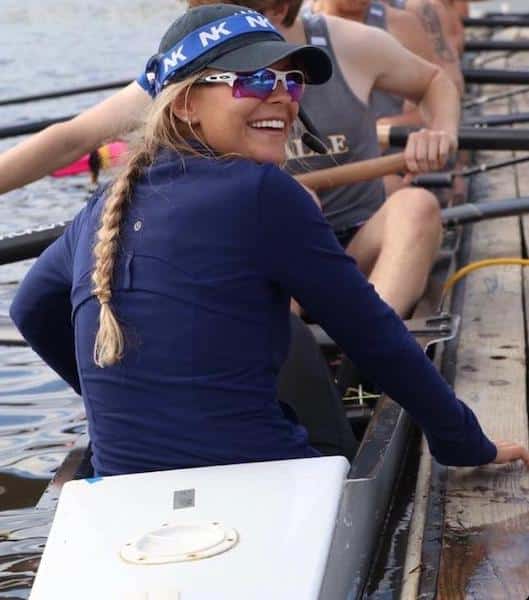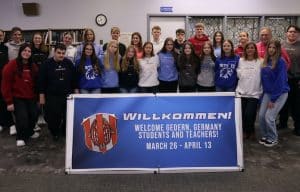Boyle rows right along

A Waterloo resident who’s bounced around the country as an athlete will soon find herself serving as coxswain for a rowing team in England.
Elizabeth Boyle currently attends LaSalle University in Philadelphia, Pa. At the moment, she’s a senior working toward a degree in history and political science.
Boyle also serves as coxswain for the LaSalle men’s rowing team. As she summed up, she serves as coach while they’re racing, directing them where to go and adjusting their timing to keep them moving as quickly and safely as possible.
Elizabeth is the daughter of Eileen and Jim Boyle. According to her, the family moved quite a bit when she was younger due to her parents’ work in the military, but they eventually settled in Waterloo to be closer to family in Bloomington.
While focused on her work as a cox for several years now, Boyle’s interest in rowing started when she was a little girl.
Her father grew up in Philadelphia – which Boyle described as “pretty much the best place to row in the country” – and participated in the sport for many years.
When Boyle was quite young, her father brought her to the St. Louis Rowing Club, where she fell in love with the sport and managed to make it onto the team in fourth grade.
“I went to a two-week camp, three hours a day learned to row, and I just tried it out for fun,” Boyle said. “And I ended up trying out for the team, and I made it. That was my eighth grade year.”
She participated in rowing locally through grade school and for her first two years at Gibault Catholic High School.
Eventually, however, the long commutes to and from practice came to be something of an issue for her, and the family began to consider an alternative that would allow her readier access.
“We looked at other options for rowing,” Boyle said. “I almost joked about the idea of boarding school, and then we kind of looked at… I was like, ‘Well, can we do that? Is that a possibility?’”
Halfway through her high school career, Boyle ventured to Culver Academies in Culver, Ind. She spoke highly of the school’s dedication to sports and noted it was not uncommon for transfer students to repeat a year of high school as she had to due to a credit issue.
During the winter of her junior year, Boyle suffered a hip injury that left her unable to row at one of the most critical points for her to show off her skills for prospective colleges.
She ended up as coxswain for the girls’ team at Culver, later making a spot for herself doing the same for the men’s team, a practice that’s quite common given the importance of weight during a rowing race.
She proved to be quite talented and happy in her newly found niche, leading her to continue her work as cox when she moved on to LaSalle and the rowing environment in Philly.
The LaSalle men’s team has been quite successful with her serving as cox, most recently placing second of 39 teams competing in the Men’s Collegiate Four-oared race at the Head of the Charles Regatta in Boston, Mass.
That recent win along with the team’s exceptional performance in a number of other competitions has left Boyle very confident in her own performance as well as that of her current team.
“The team has just been on an upward trajectory,” Boyle said. “We have kids from Germany, South Africa, Serbia, we’re racing at a much higher level. We’re the second fastest team in Philly right now. We’re going back and forth with Drexel University.”
Boyle spoke to the overall experience of serving as coxswain for her team, specifically regarding the technical aspects. While in the boat, she has a small box at her feet which lets her keep track of their speed and contains the microphone used to make sure each rower can hear her.
She noted the importance of the cox as a role in the boat. It’s quite common, Boyle said, for boats to crash in the regatta in Boston. Given the cost of the boat, oars and other equipment, a lot of responsibility is placed on the cox both when it comes to the race and the safety of the rowers and boat.
“Part of rowing that makes it such a team sport is everybody really needs to do the same thing at the same time,” Boyle said, “so essentially they shouldn’t do anything unless I tell them to do it, that way I can fix timing, fix technique.”
Teamwork is a core part of rowing, and it’s on Boyle as the coxswain to make sure everyone is working together. That’s a skill that Boyle said often comes down to experience and feel when she’s unable to directly see what every individual rower is doing.
Through their many practices and participation in competitions, Boyle has come to be incredibly close to the rowers on the men’s team. That’s a relationship Boyle spoke quite fondly of.
“Knowing that they trust me to do all of that has built such a nice relationship,” Boyle said. “I would describe them as my second family, we eat meals together, we practice together and then they trust that I can perform that job adequately, so that really means a lot to me.”
Looking to the future, Boyle will be attending Durham University in England for a master’s degree in politics. She’ll also be continuing her work as cox for a new team.
Her father expressed his pride at Boyle’s success and her upcoming participation at Durham.
“We’re excited for her,” Jim said. “It’s a great affirmation of the hard work she’s put in, so to have a school which is high competetive say she could come academically and then have a coach who is a coach for the English national team say that … Elizabeth sent some videos to him how she does the coxswain duties, and he looked at those and said ‘Hey, yeah, I’d like you here,’ which that’s good for her. She needs that.”
Boyle is similarly anticipating her time at Durham. While the move to England is a substantial one, she said her previous moves away from home for school have helped her get used to the change.
“Home has really become people and not a place,” Boyle said. “And my parents have 100 percent fully supported me. I brought up the idea ‘What if I applied to a school in England.’ No hesitation, ‘We’ll support whatever you wanna do. We’ll make it work.’”
After Durham, Boyle said she expects to focus more on her career, though she said if she ever settled down somewhere, it would need to be near water.
She entertained the idea of becoming a rowing coach but said regardless of where she ends up, rowing will always be a part of her life.






